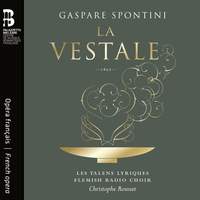Recording of the Week,
Christophe Rousset conducts Spontini's La vestale
If my inbox over the past few months is anything to go by, the buzz around today’s Recording of the Week has been building for some time: since Christophe Rousset conducted concert-performances of Spontini’s La vestale with Les Talens Lyriques last summer I’ve received a steady stream of enquiries as to whether the results would appear on CD, and the French conductor himself described the project as one of his proudest achievements when we spoke about the ensemble's thirtieth anniversary.
At first glance, a nineteenth-century opera by an Italian composer seems like a departure from the norm for a conductor who’s spent much of his career championing the French baroque (and his beloved Lully in particular) - but Rousset’s goal here was to push back against the tendency to treat the piece as a forerunner to the bel canto and verismo repertoire and instead emphasise its roots in the French declamatory tradition.

Premiered in Paris in 1807, La vestale was such a runaway success that even Spontini’s detractors fell under its spell: the extensive booklet-notes recount how a claque who’d planned to disrupt the first performance by donning night-caps to signal their boredom were won over by the ravishing writing for Julia, the eponymous Vestal virgin torn between her religious vows and her love for Roman general Licinius, who’s sentenced to be buried alive when her grand passion’s discovered by the community.
By 1845, though, Berlioz was lamenting that the work had ‘become almost a stranger to the present musical generation’, and it wasn’t until the twentieth century that it enjoyed a resurgence in popularity - thanks in large part to being championed by Maria Callas, who embraced the title-role as a forerunner to Bellini’s Norma.
These days La vestale is once again a relative rarity in opera-houses: Alexandre Dratwicki’s excellent accompanying essay makes some insightful suggestions as to how this has come about, but Rousset’s wholehearted advocacy will have you itching to see it staged in all its glory. This is the first time the work’s been recorded on period instruments (and with players well-versed in French Baroque style), and what a difference it makes: plangent woodwinds, natural horns and grainy strings combine to thrilling effect in the overture, and Rousset’s authentically brisk tempi (Spontini apparently advised that the secret to making this music catch fire is not to hang around) generate a blood-and-thunder frisson that sets the scene for the big set pieces and processions to come…
The uniformly superb cast are entirely at one with his approach,
resisting the temptation to wallow in Spontini’s long lines and ensuring
that text is always front-and-centre: this is an interpretation that
looks back to the legacy of Gluck rather than forward to French Verdi
and even Wagner (another big fan of the score). Latvian soprano Marina
Rebeka finds an infinite variety of light and shade in the taxing role
of Julia, capturing the character’s fragility without any hint of
unsteadiness but unleashing a formidable vocal blade in her great
extended scene in Act Two, which requires such reserves of strength that
the part’s sometimes been assigned to celebrated Brünnhildes.

The real revelation, though, is the Licinius of French tenor Stanislas de Barbeyrac, who’s been biding his time in lyric roles for a while but is now emerging as a force to be reckoned with in heroic repertoire. The voice is dark, firm and virile, especially in his impassioned lambasting of the High Priest who condemns Julia to death, but flexible enough to make light work of the athletic turns in the Act One duet with his sidekick Cinna (usually taken by a tenor, but sung with much nuance and depth here by baritone Tassis Christoyannis).
Aude Extrémo and Nicolas Courjal make much of the potentially one-dimensional roles of the two religious elders, and the chorus are at the top of their game – the ladies sound delectable in the Vestals’ prayer which opens Act Two, whilst the ferocity which they bring to the scenes where Julia is publicly shamed would scarcely be out of place in Peter Grimes. It’s a stunning achievement, and I can only hope that next year’s performances of Cherubini’s Médée with the same forces also yield a studio recording…
Marina Rebeka (Julia), Stanislas de Barbeyrac (Licinius), Tassis Christoyannis (Cinna), Aude Extrémo (La Grande Vestale), David Witczak (Un Consul / Chef des Aruspices), Nicolas Courjal (Le Grand Pontife)
Les Talens Lyriques, Christophe Rousset
Available Formats: 2 CDs + Book, MP3, FLAC, Hi-Res FLAC



